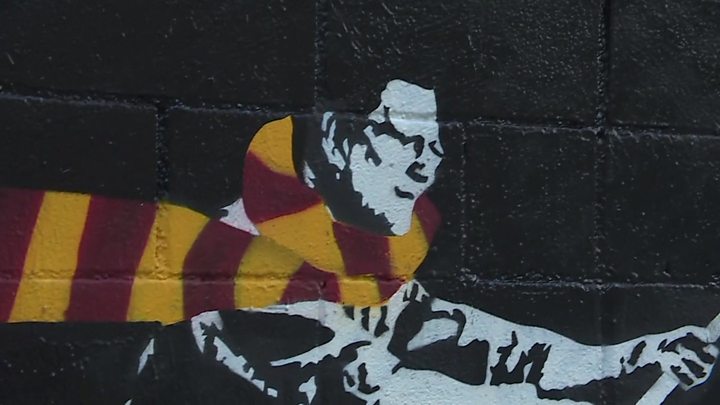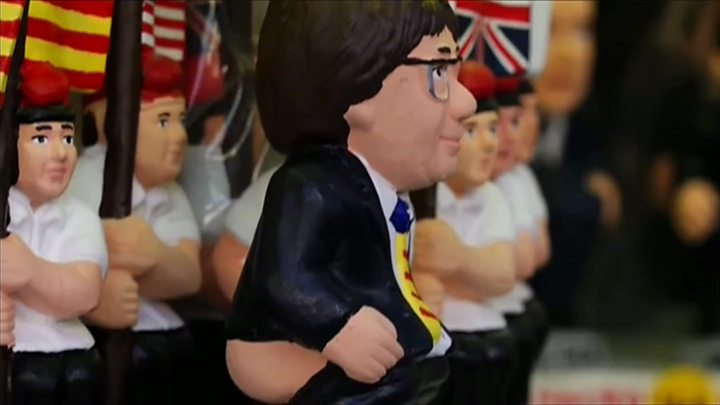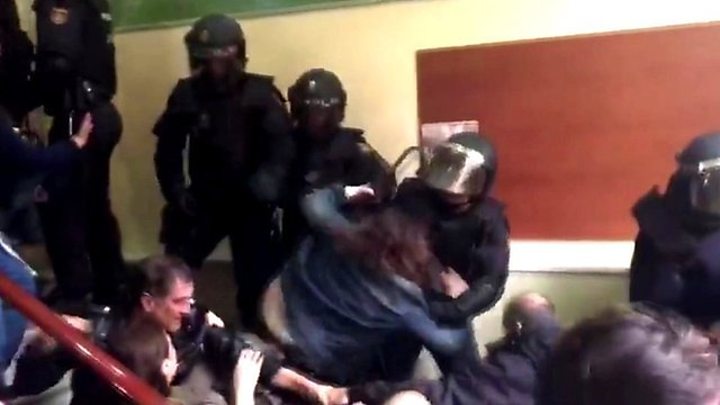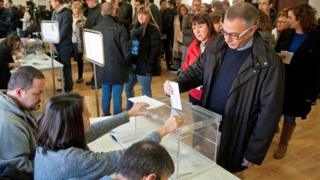Catalonia election: Voters in bid to solve political crisis
The people of Catalonia are voting in a closely watched regional election, called by Spain following a controversial independence referendum.
The snap election pits Catalan pro-independence parties against those who want the region to remain a semi-autonomous part of Spain.
All indications are that the result will be very close.
A BBC correspondent says there seems little prospect that the election will solve Catalonia's political crisis.
The Spanish daily El Pais said on its front page that one million undecided voters could have the last word.
 Media playback is unsupported on your device
Media playback is unsupported on your deviceOn Thursday, polling stations opened at 09:00 local time (08:00 GMT) and will close at 20:00, with the first official results expected shortly afterwards.
The results and reaction will be covered live on the BBC News website from 17:30 GMT. Most results should have emerged by 21:00 GMT.
- Catalonia crisis in 300 words
Long queues of voters – but no pets
By Europe reporter Gavin Lee in Barcelona
No pets allowed – it's a pooches-at-the-door policy here in the central Barcelona polling station of Casinet d'Hostafrancs, and there must be one dog to every 10 voters.
Early voters queued in their dozens here 20 minutes before polls opened – something I didn't see in Berlin, Paris or Amsterdam this year for elections elsewhere in Europe. It may point to a record turnout across Catalonia.
Opinion polls predict up to 85% of the 5.3 million eligible voters will turn out today.
In the queue Ana, a student, described today as "the most important election in the history of Catalonia". When polls close tonight the people, given the legal right to vote this time, will have shown the direction in which they want the independence crisis to play out.
Who is predicted to win?
An aggregate of polls published earlier this week by El Pais suggests the pro-independence Republican Left of Catalonia (ERC) will come top, slightly ahead of Ciudadanos (Cs), which wants unity with Spain.
The pro-independence JxCat party of ousted Catalan President Carles Puigdemont was predicted to come third. That would mean no parliamentary majority in favour of independence and possibly lengthy negotiations to form a government.
"Today we will demonstrate the strength of an indomitable people. May the spirit of #1oct guide us always", Mr Puigdemont tweeted from self-imposed exile in Belgium. Spain declared the 1 October Catalan independence referendum illegal.
But he said "this is not a normal day" and "neither is it a day of normal democracy". His team told the BBC that he was unable to vote as he was in Brussels.
The BBC's Kevin Connolly in Barcelona says there is every prospect that the two sides in the independence debate will once again end up with a similar share of the vote and the election will restate Catalonia's problem rather than resolve it.
 Media playback is unsupported on your device
Media playback is unsupported on your deviceWhy is this election happening?
Separatists who dominated the Catalan parliament declared independence on 27 October, after the referendum.
- Catalonia snap election: What you need to know
- Catalonia's quarrel with Spain explained
In an attempt to stop that referendum, Spanish police stormed some polling stations. However voters defied the Spanish courts and riot police to cast their ballots.
The move led to violent clashes with hundreds of people reported injured. Footage showing police tackling people at polling stations and pulling a woman by her hair caused outrage.
 Media playback is unsupported on your device
Media playback is unsupported on your deviceAccording to the organisers, 90% of voters were in favour of independence, but fewer than half the region's electorate took part.
Mr Puigdemont decided it was enough to declare independence from Spain.
Spanish Prime Minister Mariano Rajoy then sacked the Catalan government, imposed direct rule and called the 21 December election.
What happened to the Catalan government?
Prosecutors accused 13 Catalan separatist politicians of rebellion and sedition, including Mr Puigdemont and four others who fled to Belgium.
Among the accused, two pro-independence politicians are in Spanish prisons, and six are being monitored while on bail.
As a result, campaigning for Thursday's snap election has led to some unusual scenes, with Mr Puigdemont addressing rallies via a videolink from Brussels.
His former deputy, Oriol Junqueras, has sent messages to supporters from prison.
Reports say he sent a postal vote from prison. He tweeted a fond greeting to his wife to mark their fourth wedding anniversary, saying: "Today I wish to be with you and the children for more reasons than ever".
- Could Catalonia make a success of independence?
- Muslim woman seeks seat in Catalonia
- Catalonia region profile
In the run-up to the referendum Mr Puigdemont's JxCat party had been allied to the ERC, led by Mr Junqueras.
But the ERC has opted out of a new alliance, making Mr Junqueras the main separatist rival to Mr Puigdemont.
Catalonia in numbers
16% of Spain's population live in Catalonia, and it produces:
25.6% of Spain's exports
19% of Spain's GDP
20.7% of foreign investment
Ministry of Economy, Industry and Competitiveness, Eurostat, Bank of Spain Getty
So what about Catalonia's future?
Some voters have expressed their concerns for the future.
"I think many positions have become very extreme," said Assumpta Corell, 21, a university student from Castelldefels who said she would vote for the centrist, pro-unity party Ciudadanos.
"People who have one opinion will maintain it, people who have a different opinion will continue thinking differently, which is great, but the problem comes when politics plays at dividing people even more."
Musician Marc Botey, 47, said he would vote for the ERC but he was "anticipating problems, whoever wins".

